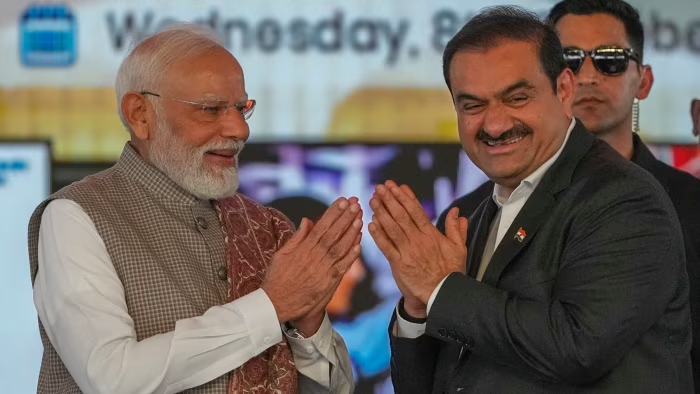The U.S. Securities and Exchange Commission (SEC) has accused Indian authorities of stonewalling its attempts to serve summons on billionaire Gautam Adani and his executives in a $265 million bribery and securities fraud probe. As Washington presses for cooperation, the silence from New Delhi is fueling speculation that India’s most powerful tycoon may be getting quiet protection at home.
BY PC Bureau
October 12: The United States Securities and Exchange Commission (SEC) told a New York federal court on Friday that Indian authorities have failed to act on multiple requests to serve legal summons and complaints to executives of the Adani Group, which is under investigation for alleged securities fraud and a $265 million bribery scandal.
The SEC, in its filing before the U.S. District Court for the Southern District of New York, said that despite repeated attempts since mid-2024, the Indian government’s Ministry of Law and Justice has not confirmed receipt or delivery of the legal documents addressed to Gautam Adani, the billionaire chairman of the Adani Group, and his nephew Sagar Adani, who holds a senior executive position in the conglomerate.
“The SEC will continue communicating with the India Ministry of Law and Justice and pursuing service of the defendants via the Hague Service Convention,” the filing stated, underscoring the agency’s growing frustration over what it described as a lack of cooperation from Indian authorities.
US Stock Exchange Authorities have caught Adanis trying to bribe $265 million to Indian State Ministers & Secretaries
— so that they raise power rates to electricity consumers
— to recoup the bribe.
Someone Big & Powerful in India is obviously spiking US warrants.
Who? pic.twitter.com/bN60vgXPUN— Jawhar Sircar (@jawharsircar) October 11, 2025
The Case That Crossed Borders
The SEC’s action stems from a 2024 criminal indictment filed by federal prosecutors in Brooklyn, New York, alleging that senior Adani Group executives bribed Indian officials to secure government approvals and energy purchase contracts linked to Adani Green Energy Ltd., the conglomerate’s renewable energy arm.
Prosecutors allege that the scheme — estimated at USD 265 million — involved illicit payments routed through offshore entities to ensure favorable treatment for Adani Green Energy in power supply agreements.
The SEC, which enforces U.S. securities laws, separately accused the Adani Group and its executives of misleading American investors by providing false disclosures about its internal compliance and anti-bribery measures. According to the complaint, company officials “made materially false and misleading statements” in filings and investor calls to conceal the alleged bribery practices.
Silence from New Delhi and Ahmedabad
The Ministry of Law and Justice, which handles foreign judicial communications, has reportedly not responded to the SEC’s latest correspondence dated September 14, nor to prior communications sent over the past year.
Meanwhile, the Adani Group, headquartered in Ahmedabad, has consistently denied all allegations. In a statement issued earlier this year, the conglomerate described the SEC’s claims as “unfounded and politically motivated.”
“The allegations are baseless. The Adani Group conducts business with full transparency and integrity and will take all possible legal recourse to protect its reputation,” a company spokesperson said.
In January 2025, Adani Green Energy Ltd. announced that it had appointed independent law firms to review the charges and internal compliance procedures — a move seen as an attempt to reassure investors and regulators following a period of intense global scrutiny.
READ: Enjoying American Holidays, Rahul Gandhi Forgets He’s LoP, Not a Diplomat
Rising Global Scrutiny of Adani
The SEC’s probe is the latest addition to a series of international investigations and reports that have cast a shadow on the Adani conglomerate, one of India’s largest infrastructure and energy groups.
The controversy first erupted in early 2023, when U.S.-based short-seller Hindenburg Research accused the group of “brazen stock manipulation and accounting fraud.” The report triggered a historic crash in Adani’s listed companies, erasing over $100 billion in market value within weeks.
While the Adani Group strongly denied Hindenburg’s claims and partially recovered investor confidence, the ongoing U.S. regulatory probe has reignited questions about the conglomerate’s financial practices and its political connections in India.
Diplomatic and Legal Implications
The SEC’s difficulties in serving legal papers highlight the diplomatic complexity of cross-border investigations involving major foreign companies. Under the Hague Service Convention, to which both India and the U.S. are signatories, countries are required to facilitate the service of legal documents through designated “central authorities.”
However, legal experts note that the process often becomes entangled in bureaucratic delays and political sensitivities, especially when the individuals involved hold significant economic or political influence in their home country.
“The Adani case is testing the limits of international judicial cooperation,” said Rebecca L. Norton, a U.S. corporate law analyst. “It’s not just about allegations of bribery — it’s about whether U.S. regulators can hold foreign corporate giants accountable when domestic authorities drag their feet.”
READ: BJP Rewrites Bihar Power Script: JD(U) Loses Big Brother Status
The Road Ahead
Despite the hurdles, the SEC has indicated that it remains committed to pursuing the case. U.S. officials believe that the outcome could set a precedent for future enforcement against multinational corporations accused of violating American securities laws abroad.
For now, the Adani Group faces a growing legal storm — from Wall Street scrutiny to Washington’s courtrooms — even as it maintains its position as a critical player in India’s infrastructure and energy sectors.
If the SEC’s allegations are proven true, it could deal a major blow to the conglomerate’s global image and deepen tensions between the United States and India over corporate transparency and regulatory cooperation.
But as of now, one thing is clear: the Adani saga has crossed borders, and the world is watching how far U.S. regulators are willing to go when India appears reluctant to act.














